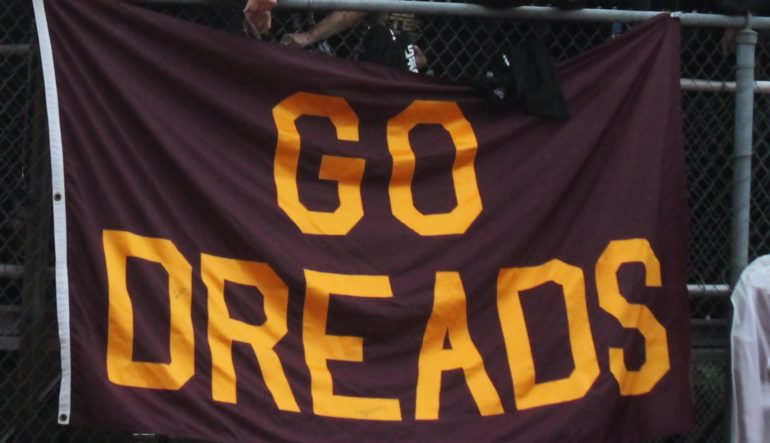The pay to participate in athletics issue has been “kicked” around in recent weeks, and at last night’s Dexter Board of Education meeting, the board discussion surrounding the topic continued for the better part of an hour. At the BOE community chat, held one hour prior to the board meeting, much of the conversation also focused on pay to participate.
An ad hoc athletics committee, formed last year, was charged by the BOE to evaluate all aspects of the Athletics Department in order to create an overall vision for the athletics program. The overview of the program covers many factors including athletic teams and programming, coaching standards, self-funded vs. district-funded sports and finances. Part of the finance discussion includes pay to participate as a piece of the athletics budget.
Currently, the pay to participate fee structure for high school athletics is $250 for the 1st sport, $150 for the 2nd sport and $100 for the 3rd sport, with a family cap of $700 per year. Middle school athletic fees are slightly less per sport, but structured similarly with the same family cap.
The ad hoc committee, supported by the BOE finance committee, is recommending that the high school athletic fee structure be changed to single tier – $250 per sport, with no family cap.
Conversations around the proposal have been long and heated on social media recently, and many attendees brought their concerns to the BOE meeting on Monday. During the first public participation portion of the meeting, several Dexter parents shared their opinions about the potential change and posed questions to the board. The common theme centered around, “how is my pay to participate money being used?”
Attendees expressed frustration regarding the proposed increase, saying that although Dexter is an affluent community, not everyone is in a position to pay $250 per sport – especially families with multiple children playing multiple sports without a family cap. A question was raised about the availability of scholarships for families needing assistance paying the athletic fees. Board President Michael Wendorf assured the attendees that scholarships will still be available under the new fee structure.
Many spoke about the potential decrease in athletes with the proposed fee change. “I’m concerned that we would be pricing families out of sports,” said one parent who is also a coach in the district. “Will I still have girls going out for my team?” Another speaker worried that the fee increase could discourage students interested in trying a new sport from doing so.
While hearing public comment, Wendorf suggested that it would be beneficial if the board held a separate community forum to discuss pay to participate more in depth. The 1-hour format of the community chat was not enough time for all concerns to be heard, and the board meeting format does not allow for discussion between attendees and the board. He also reminded those present that all ad hoc athletic committee meetings are open to the public.
During the board discussion period, Dr. Julie Schumaker started the conversation by thanking the ad hoc athletic committee for all their work in evaluating the program. She shared that the ad hoc committee’s recommendation for the fee increase came to the BOE finance committee, but that she still had questions needing answers. Many of those questions, Schumaker said, were also expressed by Dexter parents at the community chat.
In the interest of transparency and to answer those questions, Dr. Schumaker asked if the ad hoc athletic committee could create a 1-2-page document answering the following:
- What is the current athletic budget?
- What percentages of the budget is from the general fund, pay to participate and other revenue sources?
- How many high school and middle school students participate in self-funded vs. district-funded sports?
- What costs are paid by the athletic budget and what costs are teams expected to cover?
- What percentage of the general fund subsidizes athletics, and how does that compare with other schools?
- How does the proposed fee increase compare with other districts?
- Which sports are self-funded and which are district-funded?
- How many students requested scholarships/waivers in recent years and how many were awarded? What was the cost of this?
- What will be the process and costs for self-funded sports to become district-funded sports?
- What is the additional expense to bring our coaches’ salaries in line with neighboring districts?
- What would be the additional expense of bringing all self-funded sports under the district umbrella (with the exception of ice hockey and equestrian)?
Dr. Timmis took careful note of all Dr. Schumaker’s questions, asking for clarification when needed, plainly indicating he and the committee will take these concerns seriously.
After Schumaker’s comments, Dr. Timmis shared some figures in response to the question of how many students currently participate in sports. In the 2018-2019 school year, Dexter had 425 students playing a single sport, with 67 of those playing a self-funded sport. 238 athletes played a 2nd sport, 94 of those self-funded; 26 students played 3 sports, 10 of which were self-funded sports.
Board member Barbara Read agreed with Schumaker’s comments, saying she finds information on the ad hoc committee’s work to be difficult to find and that a summary document would be helpful. Read stated she hears Dexter’s parents asking, “what exactly are we getting for our extra money?” She echoed earlier comments about the potential of pricing kids out of sports, saying we need some kind of family cap.
Other board members also weighed in on the discussion. Mara Greatorex shared her concern that by raising the fee we will lose athletes. Daryl Kipke stated that the ad hoc committee is looking at what is the best possible model for funding and providing opportunity and equity to our athletes, but that it’s a zero-sum game. If the district subsidizes athletics more than they do currently, that money has to come from somewhere – where is the balance point?
Board member Dick Lundy commented that focus is needed on how we can meaningfully address families with a legitimate need for scholarships. “We need to maximize opportunities for kids and make sure that no one is precluded from participating due to the economic side,” he said.
All board members agreed that athletics is an important, value-added part of a student’s education, resulting in better attendance, better academic achievement, less risky behavior choices and overall character development. The ad hoc athletics committee is working hard to create a program that is the most effective for all students with clear goals, values and vision.








